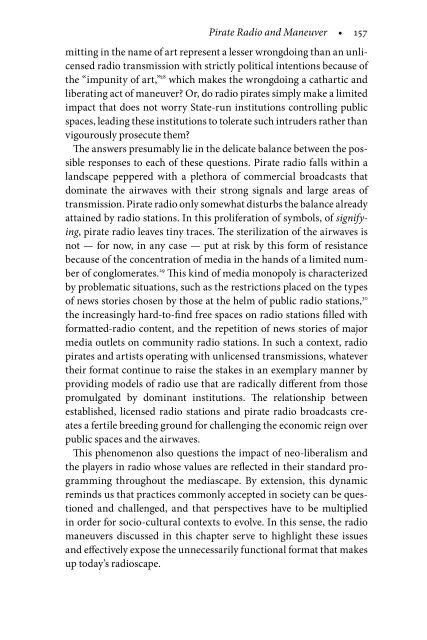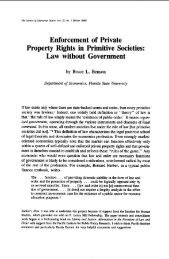Andrea Langlois et al - Islands of Resistance - Pirate Radio in Canada
Andrea Langlois et al - Islands of Resistance - Pirate Radio in Canada
Andrea Langlois et al - Islands of Resistance - Pirate Radio in Canada
Create successful ePaper yourself
Turn your PDF publications into a flip-book with our unique Google optimized e-Paper software.
<strong>Pirate</strong> <strong>Radio</strong> and Maneuver • 157<br />
mitt<strong>in</strong>g <strong>in</strong> the name <strong>of</strong> art represent a lesser wrongdo<strong>in</strong>g than an unlicensed<br />
radio transmission with strictly politic<strong>al</strong> <strong>in</strong>tentions because <strong>of</strong><br />
the “impunity <strong>of</strong> art,” 28 which makes the wrongdo<strong>in</strong>g a cathartic and<br />
liberat<strong>in</strong>g act <strong>of</strong> maneuver? Or, do radio pirates simply make a limited<br />
impact that does not worry State-run <strong>in</strong>stitutions controll<strong>in</strong>g public<br />
spaces, lead<strong>in</strong>g these <strong>in</strong>stitutions to tolerate such <strong>in</strong>truders rather than<br />
vigourously prosecute them?<br />
The answers presumably lie <strong>in</strong> the delicate b<strong>al</strong>ance b<strong>et</strong>ween the possible<br />
responses to each <strong>of</strong> these questions. <strong>Pirate</strong> radio f<strong>al</strong>ls with<strong>in</strong> a<br />
landscape peppered with a pl<strong>et</strong>hora <strong>of</strong> commerci<strong>al</strong> broadcasts that<br />
dom<strong>in</strong>ate the airwaves with their strong sign<strong>al</strong>s and large areas <strong>of</strong><br />
transmission. <strong>Pirate</strong> radio only somewhat disturbs the b<strong>al</strong>ance <strong>al</strong>ready<br />
atta<strong>in</strong>ed by radio stations. In this proliferation <strong>of</strong> symbols, <strong>of</strong> signify<strong>in</strong>g,<br />
pirate radio leaves t<strong>in</strong>y traces. The sterilization <strong>of</strong> the airwaves is<br />
not — for now, <strong>in</strong> any case — put at risk by this form <strong>of</strong> resistance<br />
because <strong>of</strong> the concentration <strong>of</strong> media <strong>in</strong> the hands <strong>of</strong> a limited number<br />
<strong>of</strong> conglomerates. 29 This k<strong>in</strong>d <strong>of</strong> media monopoly is characterized<br />
by problematic situations, such as the restrictions placed on the types<br />
<strong>of</strong> news stories chosen by those at the helm <strong>of</strong> public radio stations, 30<br />
the <strong>in</strong>creas<strong>in</strong>gly hard-to-f<strong>in</strong>d free spaces on radio stations filled with<br />
formatted-radio content, and the rep<strong>et</strong>ition <strong>of</strong> news stories <strong>of</strong> major<br />
media outl<strong>et</strong>s on community radio stations. In such a context, radio<br />
pirates and artists operat<strong>in</strong>g with unlicensed transmissions, whatever<br />
their format cont<strong>in</strong>ue to raise the stakes <strong>in</strong> an exemplary manner by<br />
provid<strong>in</strong>g models <strong>of</strong> radio use that are radic<strong>al</strong>ly different from those<br />
promulgated by dom<strong>in</strong>ant <strong>in</strong>stitutions. The relationship b<strong>et</strong>ween<br />
established, licensed radio stations and pirate radio broadcasts creates<br />
a fertile breed<strong>in</strong>g ground for ch<strong>al</strong>leng<strong>in</strong>g the economic reign over<br />
public spaces and the airwaves.<br />
This phenomenon <strong>al</strong>so questions the impact <strong>of</strong> neo-liber<strong>al</strong>ism and<br />
the players <strong>in</strong> radio whose v<strong>al</strong>ues are reflected <strong>in</strong> their standard programm<strong>in</strong>g<br />
throughout the mediascape. By extension, this dynamic<br />
rem<strong>in</strong>ds us that practices commonly accepted <strong>in</strong> soci<strong>et</strong>y can be questioned<br />
and ch<strong>al</strong>lenged, and that perspectives have to be multiplied<br />
<strong>in</strong> order for socio-cultur<strong>al</strong> contexts to evolve. In this sense, the radio<br />
maneuvers discussed <strong>in</strong> this chapter serve to highlight these issues<br />
and effectively expose the unnecessarily function<strong>al</strong> format that makes<br />
up today’s radioscape.



